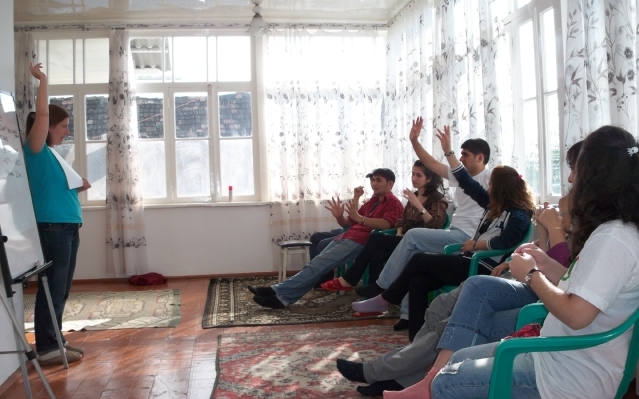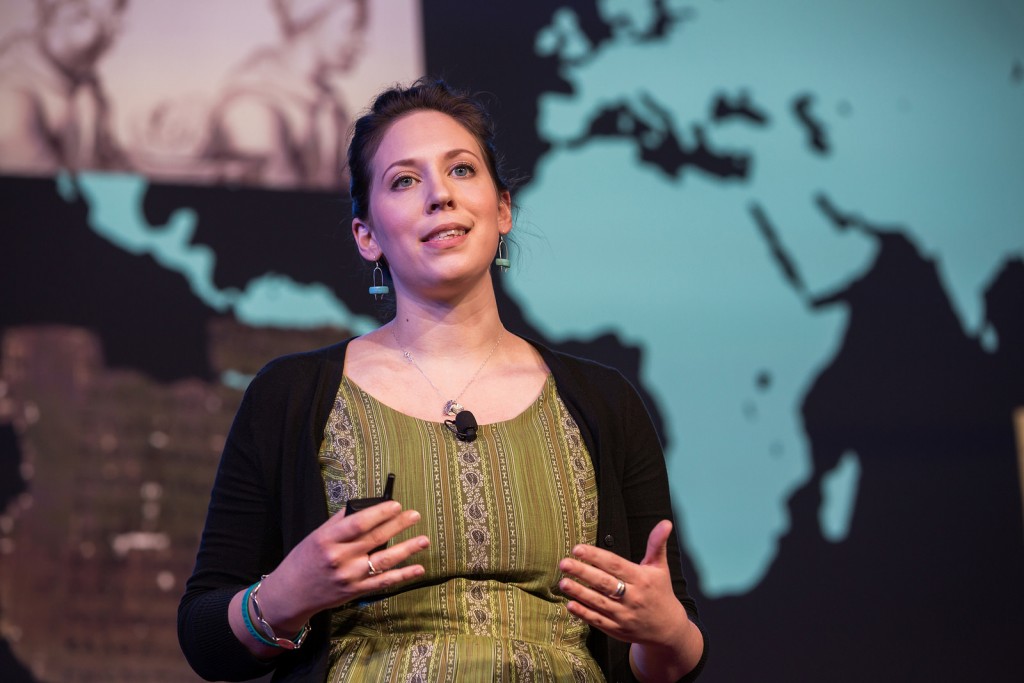Page 99 • (11,138 results in 0.035 seconds)
-

March 20, 2013 Raechelle Baghirov ’05 teaching in Azerbaijan with the Peace Corps. (Photo provided by Raechelle Baghirov) In pursuit of wild hope in Azerbaijan By Katie Scaff ‘13 Discovering your wild hope doesn’t end when you leave PLU, just ask Raechelle Baghirov ’05. After graduating, Baghirov spent three years volunteering with the Peace Corps in Azerbaijan, where she learned much more than a foreign language. “The phrase ‘a life of service’ was thrown around a lot. Professors would talk
-

March 10, 2014 A National Honor for ‘Digging into Cancer’ ‘Fast Company’ magazine names Hunt one of its 100 Most Creative People of 2014. A Survivor in the Global Spotlight Katie Hunt ’11 fought cancer at PLU, leads the emerging field of paleo-oncology and wowed the crowd at TED2014 By Sandy Deneau Dunham PLU Marketing & Communications After hearing Katie Hunt’s story—of survival, determination, success, worldwide acclaim and infinite promise—you’re likely to experience one of two powerful
-

July 24, 2014 In the Business of Making Connections Dan Rosales, left, and Daniel Smith, both ’07, are on the board of PLU’s Business Network Alumni Association. (Photo: John Froschauer/PLU) Marketing graduates’ paths bring them together—again— on the board of PLU’s Business Network Alumni Association By Sandy Deneau Dunham PLU Marketing & Communications It’s not surprising that Dan Rosales ’07 and Daniel Smith ’07 discovered their life paths at Pacific Lutheran University—that’s just what
-

Renzhi Cao innovates in the classroom Posted by: Zach Powers / June 5, 2022 June 5, 2022 By Lisa Patterson ’98ResoLute ContributorIf you search for the CV of Assistant Professor of Computer Science Renzhi Cao, Ph.D., you’ll find a list of published research papers longer than Foss Field. He says it’s a great feeling when a new piece of research is published. But what he finds most rewarding is bringing his students alongside and sharing with them the value of hard work, hands-on learning and
-
Absence in excess of one year requires a letter of withdrawal submitted to the Recruitment, Admission and Progression (RAP) Committee prior to leaving. Students withdrawing from the School of Nursing and the university should follow the appropriate procedures for facilitating future return or transfer to another institution. Returning to the PLU School of Nursing will require reapplication to the nursing program. Readmission is neither guaranteed nor implied, as well as cohort pricing is not
-
If a violent incident or some other incident occurs outside your building, please stay inside or shelter-in-place. If there is an imminent threat of violent, the entrance doors should be locked by you or those designated to carry out a lock down in your building. In addition, you should lock classroom or office doors, if possible and hide from view of windows. The university may initiate a modified lock-down where the doors are locked, but normal academics and operations continue. An
-
Applying for Graduate School in PhysicsSo you think you want to go to graduate school in physics? Great! This is meant to be a guide to help you think through the process and outline the steps you will need to take as you begin this path. Reflection: Before You Begin Why do you want to go to graduate school? What should you expect in physics graduate school? These are some questions you should begin asking yourself, though you don’t need to have all the answers yet. Below are some resources to
-
Appreciations: In Recognition of Mark JensenMark Jensen began his career in the French Program at PLU in 1989, fresh from Berkeley. A specialist of nineteenth-century French literature but polymath at heart, Mark wrote his dissertation on Alfred de Vigny’s historical fiction and is a leading scholar of Paul Bénichou, a preeminent critic of French Romanticism. Mark translated, with characteristic precision and elegance, several of Bénichou’s works from French into English–notably The
-
Expanding the Mind in German StudiesThe German word for the humanities is die Geisteswissenschaften – literally translated, the sciences of the spirit or of the mind. The term, coined by the historian Wilhelm Dilthey in the 19th century, has its roots in the German philosopher Georg Wilhelm Friedrich Hegel’s concept of “Geist” as a superindividual cultural consciousness. (In English we encounter the German loan word “Geist” in the term Zeitgeist, which describes the spirit of a particular
-
As scholars of the Humanities in the 21st century we find ourselves working in unusual settings. Places of faith and worship, educational contexts like high schools and public libraries, in newspapers, in comment forums, on radio shows, our “workplaces” often do not resemble the ivory towers of old.Vignette #1 Prime Time Family Reading Night I ask the question again… “what are symbols and why are they important?” My audience, a mix of children ages 6 to 10 and their families, settle into the
Do you have any feedback for us? If so, feel free to use our Feedback Form.


